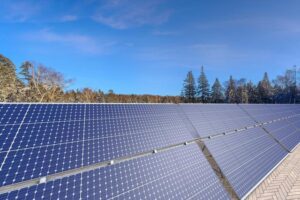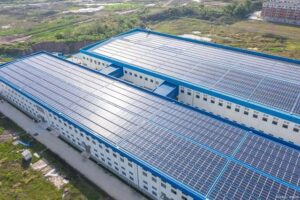In the wave of green energy, solar panels are undoubtedly one of the leaders. It has won global favor due to its inexhaustible and inexhaustible characteristics, as well as its almost zero pollution power generation process. But you know what? During the use of solar panels, their temperature may also reach an astonishing height. So, how high is this temperature really? What kind of impact will it have on our use?
1、 The working principle of solar panels
Firstly, let’s understand the working principle of solar panels. Solar panels, also known as solar panels, have the core function of converting sunlight into direct current. This process depends on the photovoltaic effect, that is, when sunlight shines on semiconductor materials, photons will interact with the material, causing electrons in the material to gain enough energy to jump out of the material, thereby forming an electric current.

2、 The “heat” problem of solar panels
However, when a large amount of sunlight is concentrated on the solar panel, the panel itself will also heat up. This is an unavoidable phenomenon. In fact, according to research, in environments with strong sunlight, the temperature of solar panels can sometimes even reach 70 degrees Celsius or higher. This raises a question: Will excessively high temperatures affect the efficiency of solar panels?
3、 Efficiency issues at high temperatures
Research has shown that the power generation efficiency of solar panels is indeed affected by temperature. As the temperature increases, the open circuit voltage of the solar cell will decrease, which will lead to a decrease in conversion efficiency. Simply put, high temperatures can make solar panels lazy and unwilling to produce more electricity for us.
Evaluate the sensitivity of its product to temperature through temperature coefficient, expressed as a percentage per degree Celsius. Testing the power output of solar panels at 25 ° C is a standard practice. Therefore, if the rated temperature coefficient of a battery panel is -0.50% per degree Celsius, then for every 25 degrees Celsius (77 degrees Fahrenheit) increase in temperature, the output power of the battery panel will decrease by half a percentage point. Although this number may sound small, the surface temperature of dark roofs in summer may be much higher than 25 ° C. But does this mean we should avoid exposing solar panels to high temperatures?

4、 Balancing and optimizing
The answer is negative. Although high temperatures can indeed reduce the efficiency of solar panels, we cannot give up eating just because of choking. In fact, many modern solar panels have been optimized and designed to maintain relatively stable efficiency in high-temperature environments. Moreover, from another perspective, the reduced efficiency of solar panels in high-temperature environments is actually a form of energy conservation. Because this means it can convert more sunlight into electricity instead of heat.
5、 Future challenges and opportunities
With the continuous advancement of technology, we believe that future solar panels will be more efficient, durable, and adaptable to various environments. But before that, we still need to continue to pay attention to and study the performance of solar panels in high-temperature environments, in order to achieve more effective utilization and management of them.
epilogue
How high can the temperature of solar panels reach during use? This is a complex problem that involves multiple factors and variables. However, we should all recognize that as one of the representatives of green energy, the widespread application and continuous optimization of solar panels are of great significance for promoting global energy transformation, reducing carbon emissions, and protecting the environment. Therefore, we should pay more attention to and study this field to achieve more efficient and sustainable energy utilization.




